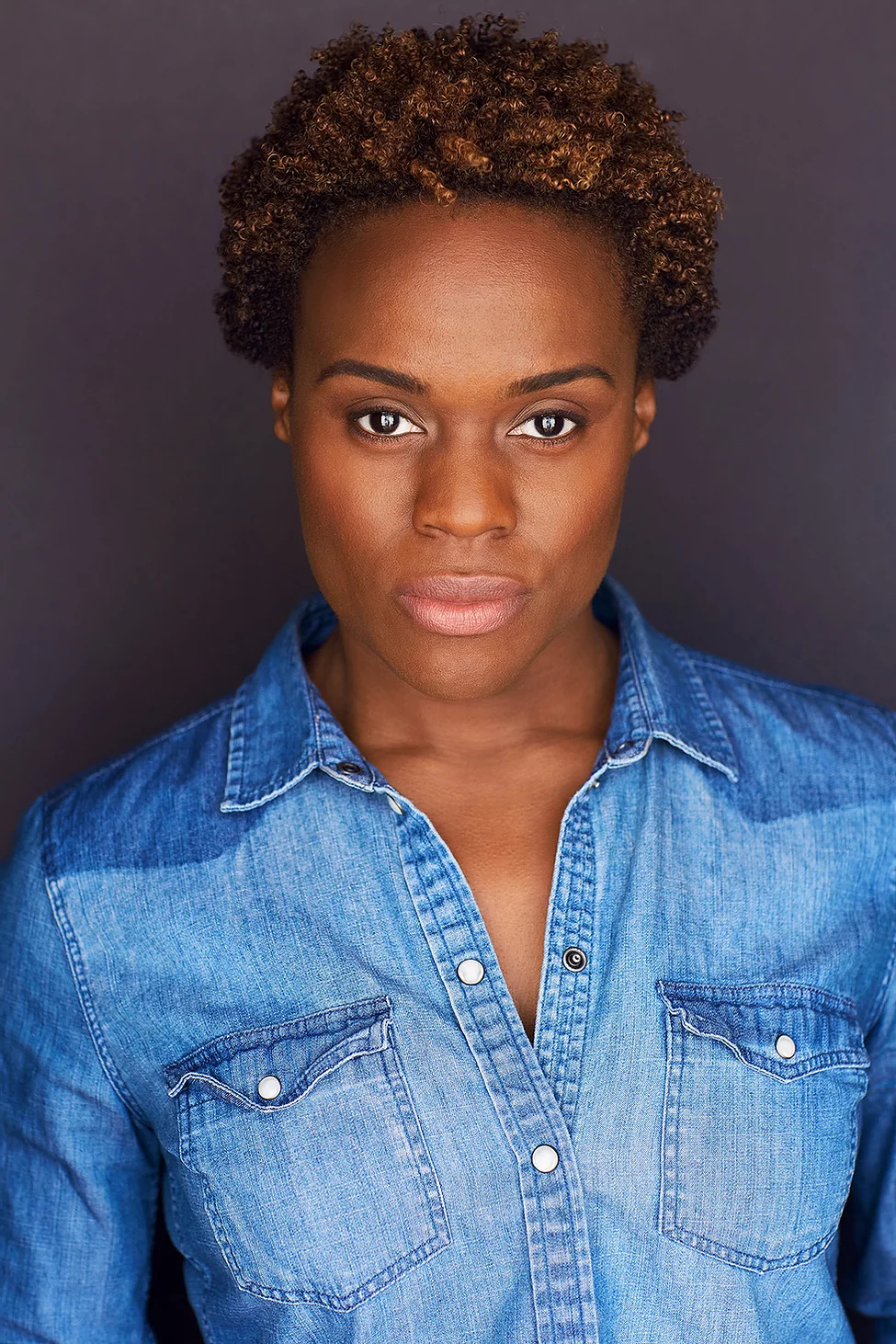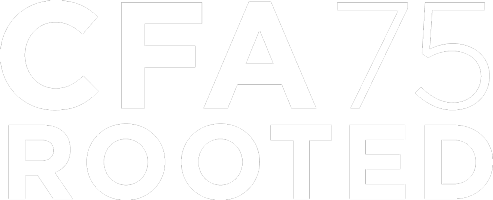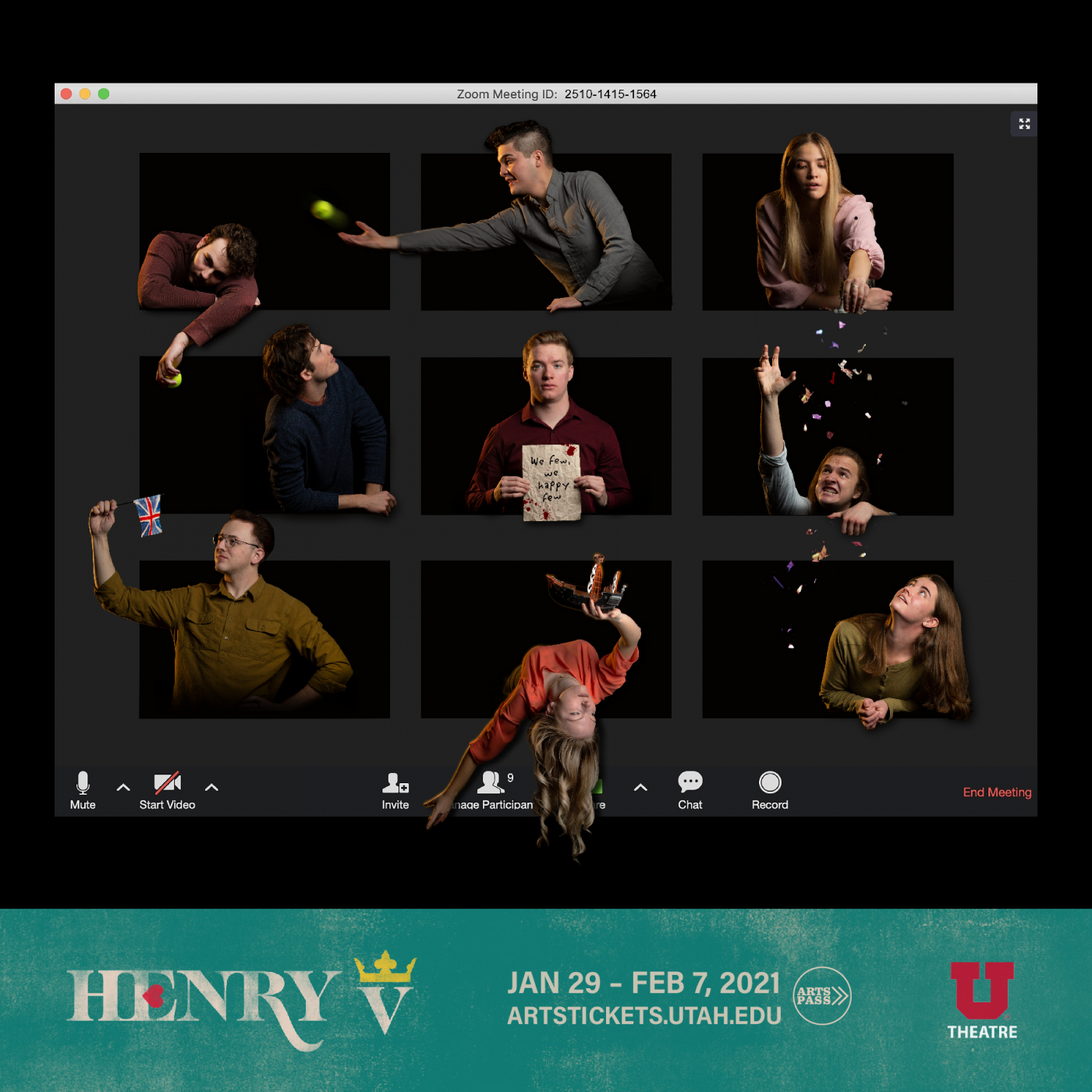The University of Utah Department of Theatre is excited to present "HENRY V," from January 29th - February 7, 2021 via virtual live stream!
After being rehearsed entirely online, the second virtual theatre production of the 2020-2021 season begins live-streaming this Friday.
Forget about “The Queen, “The Favourite,” or “The Crown”—Shakespeare has been serving up royal drama for over 400 years. In HENRY V, a young monarch with a checkered past wages war on France and his own reputation. As he moves from battle to battle, wielding swords and words with equal skill, Henry must discover for himself whether a good man can also be a good king.
Directed by returning guest artist Stephanie Weeks, this virtual re-imagining of HENRY V will be performed live and streamed online for a one-of-a-kind theatrical experience.
Jan 29, 30 and Feb 4, 5, 6 | 7:30pm
Jan 31, Feb 6-7 | 2pm
Get your tickets here!
To get a closer look at the process and production, Department of Theatre's Aaron Swenson connected with director Stephanie Weeks. Here's what she had to say. HENRY V Director Stephanie Weeks
HENRY V Director Stephanie Weeks
So in the interest of full disclosure, we’re doing this interview on the phone rather than Zoom—which is not a knock on Zoom! In fact, I’m curious about any gifts it’s brought to the process. Can you speak to that?
Well, for one thing, I am in New York. I know there's no way I could possibly be doing this play in Utah and teaching here if it weren’t for Zoom. There’s a loss of connection on one level, but it leads to other things you wouldn’t expect. And I like to think of myself as a director who is pretty open. I have ideas I want to start with, but the processes that I love are super organic, that can only happen with that group of people. I've gone into projects where there’s only space for that director's vision, like, "Stand here. Say this. Do this." There’s no room for interpretation, and I like to create spaces where that's still allowed. We have to invite and cultivate and constantly create play in whatever space we have.
For example, one thing that’s cool about Zoom is how we’ve found ways to be present and available for one another. We don’t get those side conversations you can have in person, but I also don't disable the chat. So many things happen on chat that are just so funny and witty and charming, and it’s a side of them you might not see in the room. It’s this parallel conversation where they're joking with each other, and with me, while they're still working, but in ways that feel necessary for the work. I get to know them in a different way, and we make discoveries that add to the production. And it's necessary for our wellbeing because we're so isolated, right? We need that bit of levity, where we’re not caught up in notions of "working."
Do you feel that this particular group is a crucial part of this recipe when it comes to that?
Absolutely. It's a small group of only nine actors—mostly seniors and a couple of juniors—so most of them have known each other for years. And they are all so game because they've been with each other for so long. They already have an intimacy that would be, I really believe, impossible to build. This is a play about history and relationships, and it’s been so lovely and useful to have these relationships already in place. And for as well as they know each other, they are also surprising each other, and I love that.
It would be incredibly hard do this piece without that level of intimacy and trust because, essentially, we are all in our own individual spaces working with a camera and a screen. And yes, there are people on that screen looking into their cameras as well, but for all intents and purposes, you're working alone.
Can I ask what interested you about this project, considering the circumstances? It wasn’t the original selection, to start with…
Yes, they had to pivot because of the pandemic, as you know. We all did. I think “Cymbeline” was going to be the “classic” piece this season. But later in the summer, Robert Scott Smith approached me and said, "Would you be interested in doing ‘Henry V?’ Does that interest you at all? It doesn't necessarily have to be ‘Henry V,’ but I think the students would benefit from having you there.”
It was interesting because I have a history with “Henry V.” I'd seen a bunch of Shakespeare all my life, basically, but it felt archaic, or contained, or boxed in. And then I saw a production of “Henry V” at Stratford when I was studying in London, years ago. I was in the last seat of the last row; I couldn't have been further back. And it was really quite stunning. They’d set it as if it were in World War II, but the original was around the War of the Roses. So the very first image was thousands of rose petals falling to the floor, which had been set with a Roman numeral five.
So you had these roses evoking land and earth, on this floor marked with a huge “V,” juxtaposed with the nastiness and brutality of fighting over something beautiful. And I was so struck by that image. And then it came to the wooing scene of Henry and Kate, and I was floored. I was weeping. This man, who was so merciless and heroic and cold and larger than life, gets in front of this woman and is completely a bumbling idiot. He's human.
It was so lovely. It wasn’t just some patriot play. It said so much about cruelty and love and self-doubt and the need to conquer, and the conflict between romantic ideals and the reality of war. It was the first Shakespeare I’d ever seen where it all came together and I got it.
So with this project, you’re thinking about college students and how they can make the story relevant for themselves under these circumstances. And what I love about Shakespeare are the stakes. The stakes are always so high. So I’m thinking, "Huh, it's pretty amazing to be in an election year, and we just had an inauguration in a pandemic. Lots of unrest in the country, lots of division. The stakes couldn't be higher.” What an incredible opportunity, to bring this play to life and investigate what it means now.
And that was my next question. The idea of having all nine actors share the role—where did that come from?
I always ask actors what role they want to play and why. I'm interested in treating actors as artists, because they are, right? And I'm interested in how they think about character, and how they collaborate. I find it very useful.
When I received the audition videos, for the most part everybody said, "I want to play Henry.” It's interesting: some of the women who auditioned said it kind of shyly, like they shouldn't want to, right? I've been in that position where I wanted to play a part that's really fierce and interesting and complex, and that part happens to be written for a man. I thought, “if I want to make space, and cultivate play for them and for myself, and challenge everyone as artists, then let's do it. Let's see what happens when we say, ‘Okay, the play is big enough. Can it hold us?’” It may be their only shot to do this role. It could spark their exploratory imagination. Who knows?
It's been really exciting to watch. Each of the actors is so wonderful. They're all bringing themselves to the work. They're putting themselves in the role, which means we’re working at varying degrees, coming at this from varying angles. But they are meeting it—the Shakespeare and the requirement of Henry. They’re not shrinking down from it or shying away. It’s very exciting to witness both as a director and as an educator, because they are seeing themselves in the role: as a king, as a leader, as a human, with these incredible stakes at hand.
FOR THE FULL INTERVIEW CLICK HERE


